Our gay travel guide to India is based on our personal experience – practical safety tips, top things to do, gay highlights, best foods, and more.
Touchdown in Delhi, the first thing we see are men walking the streets holding hands…
This is a tradition so deep-rooted in the culture of India: men are very docile around each other, whether straight or gay. It's not that they're attracted to each other, it's just simply one of those cultural norms that caught our eyes!
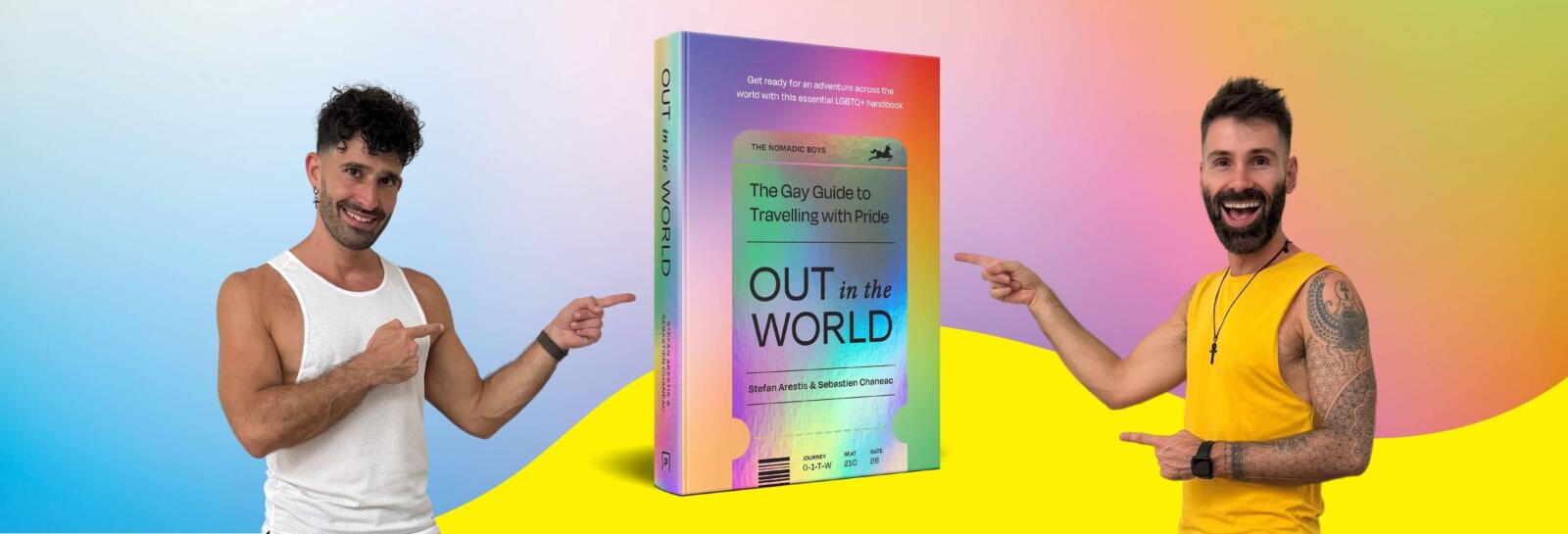
India is often a monstrous feat for tourists. It's so big, so full of culture, so diverse, that it's impossible to decide where to visit if you're going for a short trip. This is why we didn’t just go for a short trip; we went on a month-long journey covering as much as we could from north to south.
From cruising along the backwaters of Kerala, taking in the sounds of wild birds and air whistling through the trees, the Ghats of Varanasi, to the fiery food, that would burn the tongue of any ole’ Westerner (where the hottest spice we’re used to is salt!), India sets out to transform your perception of the world.
What called us to India in the first place? Was it the Taj Mahal, with its monumental appearance, a marble fortress set against the dazzling blue sky? Perhaps it was the jumbled landscape, with the extremes of sparse open fields lying next to a never-ending jungle, that lies adjacent to a labyrinth of a city filled with delicious smells, ancient temples, and busy markets? Or the people: full of color, sass, lots of head wobbling, and plenty of smiles.
Famous for their unwavering hospitality, Indian people welcome tourists with an open embrace. Everywhere we went, we were met with smiling eyes and greetings of warmth. Chatting with merchants in the street we got to hear all sorts of fascinating stories about their local lives. The hustle and bustle, people brushing past you in tight quarters, and avoiding pickpockets were no mean feat but when matched with the gentle and beautiful hearts of the majority of Indians, it's all so worth it.
To learn more about all things tourist-y, food-y, and party-gay-centric around India, check out our ultimate gay country guide 2025 right here!
Heads up: We just wanted to let you know that this post contains affiliate links. That means if you book something through one of those links, we'll get a small commission, at no extra cost to you. It helps us keep our blog going – so thank you in advance for your support! ♥
Taj Mahal – check! Holi Festival – check! 12 days of fiery vindaloos and aromatic curries – check, check, and check again! Our friends at Out Adventures have really outdone themselves with their cultural tour of India. The all-gay adventure snakes through the colorful province of Rajasthan, giving travelers an unfiltered look at one of the world's most fascinating countries and authentic cultures.
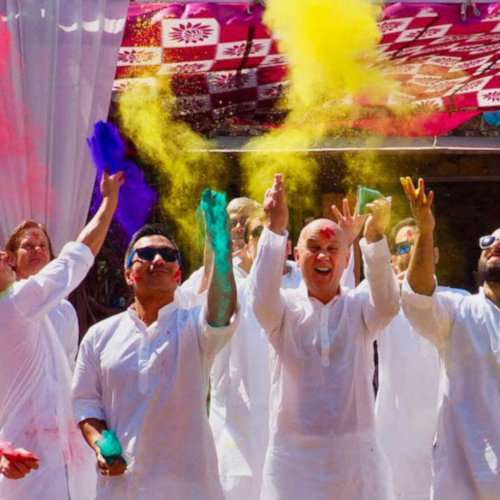
LGBTQ Rights in India
Hallelujah! Being gay is legal in India. Having finally passed through the Indian Supreme Court in 2018, LGBTQ citizens are free to love whomever they desire. Transgender people also have the right to change their gender and undergo surgery for this, so there is a whole community of those known as the ‘third gender’ or ‘hijaras’.
Though whilst one battle is over, a long war still lies ahead in relation to LGBTQ rights in India. Marriage equality is still yet to be recognized, and whilst there are movements to get this through legal books, it's still very much early days. Similarly, LGBTQ people also don’t have the right to serve openly in the army.
Luckily, when it comes to acceptance of gay people, Indians are slowly becoming more tolerant, particularly teenagers and those in their 20s. For example, a poll carried out by the Indian Institute of Technology (IIT) in Delhi revealed that 72% of those in attendance agreed gayness was a normal thing. A big win if you ask us!
Although, like most places in Asia, India is overall a very conservative society where being gay is frowned upon. Men have a lot of pressure from their families to marry a woman and produce lots of children. For this reason, we'd definitely recommend being careful and vigilant with PDAs in India. For more, read our interview with gay local Raj from Delhi.
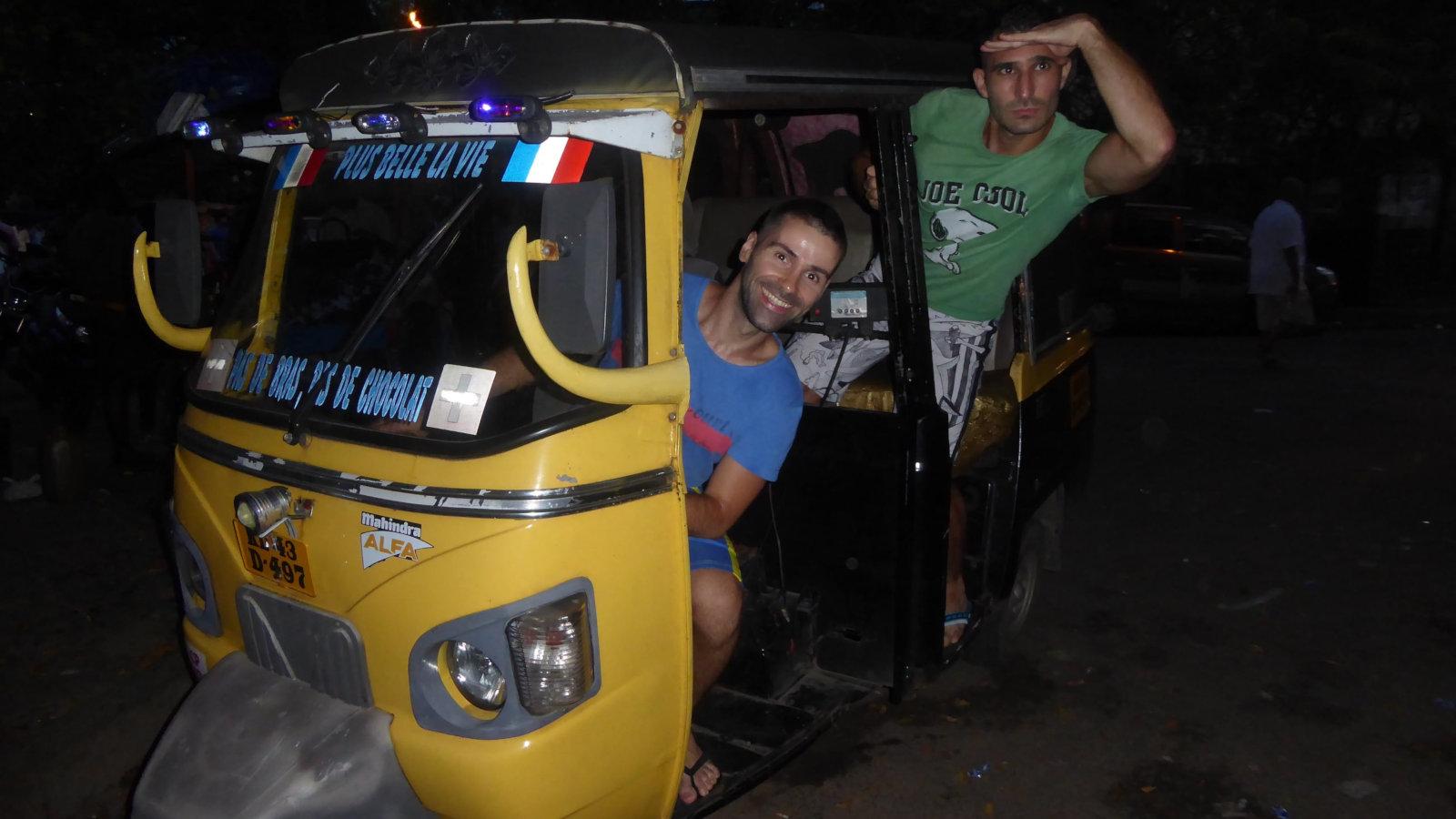
Is India safe for gay travelers?
Overall yes, India is a safe place to travel, whether you are gay or not. Whilst the situation can be quite challenging for local gay men, for foreigners, it's a very easy country for LGBTQ travelers. Indians love foreigners, so much so that you will frequently be asked to have your photo taken!
Though as we said above, there is a large chunk of Indian society that retains a very conservative outlook on the LGBTQ community, so definitely don’t go around smooching in front of large crowds and check with your hotel that they're cool to host a gay couple unless you know for certain that it's a gay friendly hotel.
We also recommend that you are always aware of your general surroundings – remember India has a lot of extreme poverty, so don't go flaunting that Rolex in the streets in a hurry and take care with your pockets in crowded areas.
Be careful of your passports, credits card, and other personal belongings as pickpockets are common in India and it is very difficult to spot them. We suggest you include pickpocket-proof clothes in your India packing list, it will come in handy especially in touristy places when it gets very crowded.
Over the last few years, India has become more and more tolerant of LGBTQ people. Remember, this is a country that has the world's first openly gay prince – Mr. Manvendra Singh Gohil. In addition, do the maths, for a country with a population of around 1.4 billion, assuming that 6% of society is queer, that means India has an estimated LGBTQ population of around 84 million! And let's not forget Bollywood, which has famously released an unapologetically gay Bollywood movie called Shubh Mangal Zyada Saavdhan (Extra Careful of Marriage)!
There are also so many gay events taking place throughout the country. With nearly every major city having its own Pride event, plus loads of film screenings and gay art festivals – we LGBTQ folk are certainly battling our way into people’s hearts through our loud, colorful parties. The large attendance at these festivals is also a testament to how much more we are becoming accepting. Long may it continue!
Top gay friendly cities in India
Not every city can be like Amsterdam, Fort Lauderdale or Barcelona, which are just a handful of the ones we rate as the most gay-friendly cities in the world. Though with India having decriminalised homoesxuality and public opinion slowly changing, cities across the nation are adopting more queer spaces. Here are some of the cities in India which have the best gay scenes:
Delhi
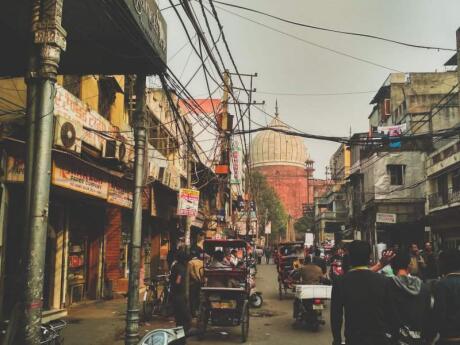
What can we say about Delhi that will capture its essence? It's chaotic. It's loud. It's colorful. It's smelly. It's jarring! Filled with unexpected surprises. It is a place like no other. Whistle on down to the gay scene, and you’ll find the alluring Delhi madness, only with the heightened camp that we gays bring. For nightlife, you can’t go wrong with bars like Depot 48. Every Tuesday is ‘Pink’ in their eyes, with patrons throwing on their best outfits and dancing the night away. Another awesome gay night out in Delhi is “Kitty-Su” on Thursday evenings in The Lalit.
Mumbai
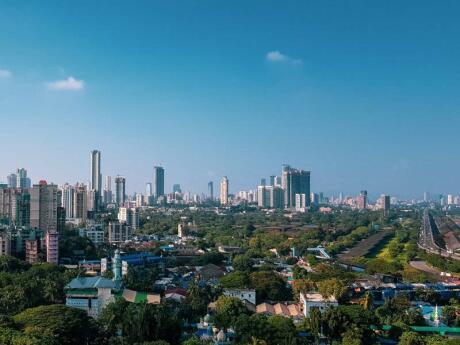
Home to the country’s biggest film industry, one of the world’s largest tropical forests, and a thriving fashion epicenter, Mumbai is an expansive city that 18 million people call home. There are regular gay meetups and gatherings organized by the Gay Bombay group, as well as gay parties by Salvation Star. For nightlife, there is no better place to head out to than the Beeyond Neighbourhood Bar. Kitty Su also has a home here, along with other awesome queer friendly bars like The Ghetto and Cafe Mondegar.
Bangalore
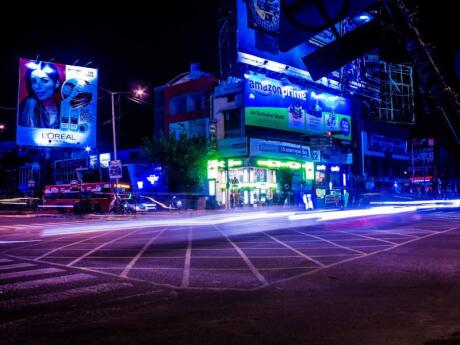
Bangalore is famously nicknamed the Silicon Valley of India, due to the high number of multinational IT companies based here. The city is thriving with young, hot people, fresh out of college, making it a very tolerant place. The gay scene is small but very active. We came by lovely spots like the Pink Sky Bar and the Chin Lung resto-bar. There is no better place to get a view of the Bangalore skyline than the Pink Sky Bar. The high street is filled with luxury boutiques, gourmet restaurants, and premium fashion. We were astounded looking at the price tags but hey, we gals can dream, right?
Goa
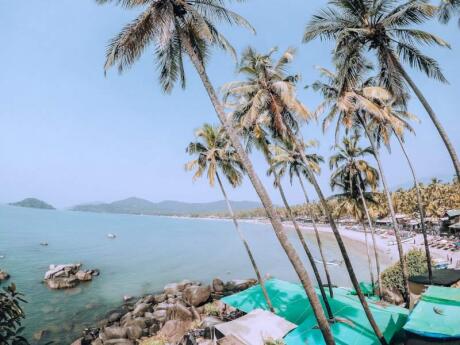
We’ve been very cosmopolitan-focused so far with our gay-friendly Indian cities. But you know it wouldn’t be a true Nomadic Boys trip without a visit to a beach. With Goa, there are beaches in their plenitude. The coastline stretches on for miles, with smooth, golden sands, tropical trees, and clear blue ocean waters. There are no real gay bars but there are some gay friendly places to hang out. Love Passion Karma is a waterfront club that's amazing for dancing and has some really cool but slightly bizarre decor. SINQ is a very trendy bar with a poolside deck, lounge, microbrewery, and nightclub.
Chennai
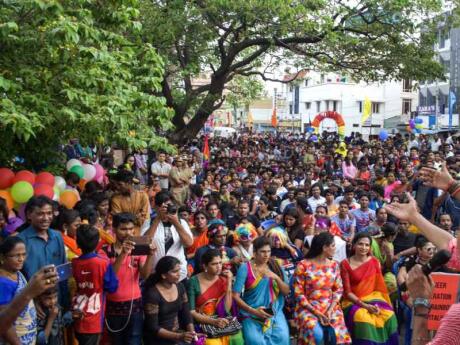
Chennai has one of the biggest, brightest, and lengthiest Pride marches in all of India – so it holds a special place in our hearts for that reason alone. When exploring, we found some LGBTQ-friendly hotspots to hang out in, meet gay and gay-friendly locals and act like our usual, campy selves. Chennai doesn’t have as vast a gay scene as some of the other cities, so be careful about picking where to go. Some places are quite open and tolerant, but that doesn’t go for bars in Chennai across the board. Most gay spaces in this city are very under the radar still, so you'll need to connect with gay locals on Grindr and Instagram to get the latest scoop.
Pune
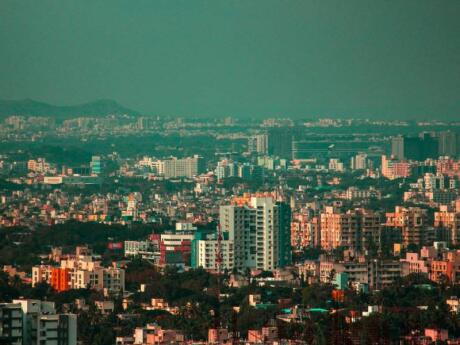
Pune is the epicenter of all things university, business, and youth. So much so that it is considered the ‘new India’. And with the majority of young Indians in support of marriage for all, you can be sure that this is a city that is of keen LGBTQ interest. One place to check out is the Celebrity Country Club, a fabulous spot with a sauna and spa that caters to lots of gay or bi men. The views from the room look stunning, overlooking the lush gardens and natural surroundings. The Farmaaish Lounge and Bar throws occasional LGBTQ nights known as “MIST”. Entry rules are quite strict to ensure spaces are kept as queer-friendly as possible.
Top experiences in India for gay travelers
India is a beast of a country. There are thousands of experiences lying at your feet, so much so that we were initially tearing our hair out narrowing down what we could do. Suffice it to say we were thrilled with the choices we made. India changed our lives. Every experience helped reshift our view of the world, leaving us with a thirst to return for more. We’ve listed our highlights and must-see attractions that we know gay travelers will love!
Marvel at the Taj Mahal in Agra
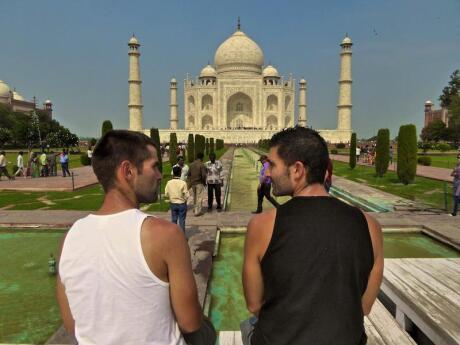
Much like the Emerald City that lies in the heart of Oz, the Taj Mahal holds a magical allure that captures the imaginations of people from all around the world. Who doesn’t aspire to visit the Taj Mahal one day? We decided to make that dream become reality – and oh boy were we glad we did! Its ivory-white walls sit on the south bank of the Yamuna river in the Agra countryside. The Taj Mahal contains a tomb, which contains the body of the favorite wife of Shah Jahan, the Mughal Emperor. It was built as a tribute to her, taking over 22 years and the hard work of 20,000 artisans to finish. The ultimate sign of true love!
Visit Delhi's Red Fort
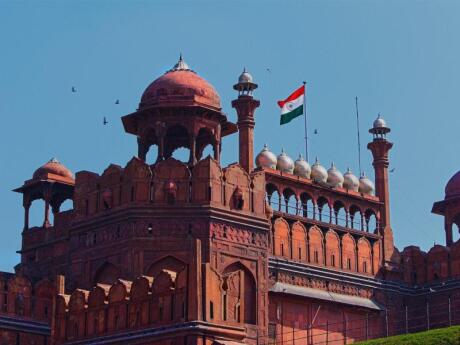
The first thing you should know is that Delhi is basically eight cities combined into one. Many of these cities are built on top of the ruins of its predecessor, leaving ancient remnants dotted throughout. An example of this is the Red Fort. Having once served as the residence of the Mughal Emperors, Delhi's Red Fort consists of several buildings, temples, and gardens. It is surrounded by a wall that stretches 18 meters over the ground. The fort is speculated to house the bodies of prisoners, which is said to be for luck. If you're short on time you can buy a combi-ticket for Red Fort, Humayun's Tomb, and the Qutub Minar.
Explore Jaipur – the Pink City!
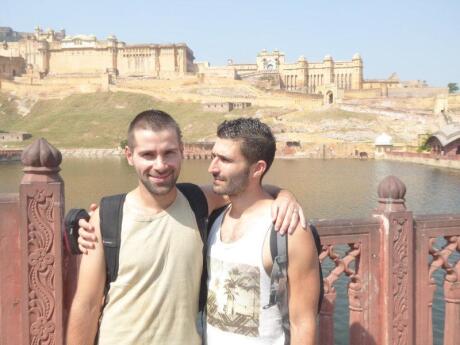
Red is daed. Blue is taboo. Yellow's too mellow. Brown makes us frown. If we could paint a city in just one color, we’d go for pink. Hence why we fell head over heels for Jaipur the Pink City! The pink walls of the City Palace and temples add an almost therapeutic quality to this otherwise quite chaotic side city. Dodging motorbikes, rickshaws, men riding camels, and kids chasing each other, it's alive with character. It's also known for being the location of the ‘Best Exotic Marigold Hotel’ starring legendary actresses Judi Dench and Maggie Smith. From those two broads to us two broads, Jaipur is as wonderful as it looks on the big screen.
Admire the opulent palaces of Rajasthan
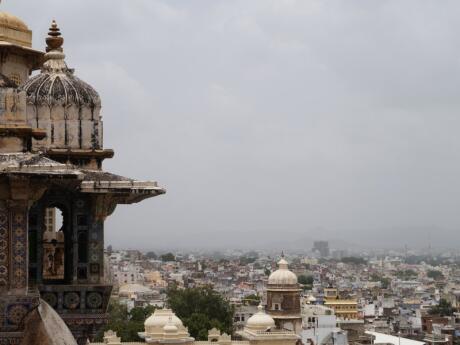
If heading to Jaipur, we recommend exploring more of the state of Rajasthan. Udaipur, known as the White City, is considered one of the most romantic places in India. It is very much a city that feels as if it was made for queens! The City Palace Museum has tons of heirlooms, portraits, and memorabilia from the royal family – be prepared to have some serious envy. Don't miss out on exploring some of Udaipur's most popular attractions, like the huge UNESCO World Heritage Site Kumbhalgarh Fort and the stunning Jain Temple in Ranakpur – one of the five holiest Jain shrines in India.
Experience the holy city of Varanasi
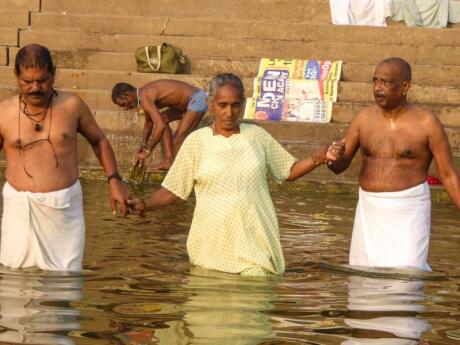
We try not to pick favorites. But if you forced us to answer what our favorite place in India was, it would be Varanasi. It's a fascinating city where people come to bathe in the sacred Ganges river, as Varanasi is considered one of the holiest places for Hindus. As well as bathing, and washing clothes, Hindus cremate their lost loved ones beside the Ganges and then scatter the ashes onto the waters as well. As such a spiritual place, yoga and meditation are very popular in Varanasi, so of course, we gave that a try too. Make sure you read more about our time in Varanasi if you're thinking of visiting this unique place.
Spot the spicy hot sculptures at the Khajuraho Temples
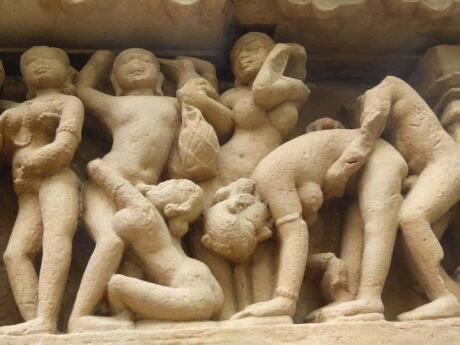
In Khajuraho, there is a group of temples believed to have been built sometime around 950 AD. Within the temples are displays of statues depicting humans in all kinds of forms, states, and emotions! Many are open to interpretation but some are very clear in what they are trying to express. You may spot some super suggestive sculptures, many of which are gay gay gay! Of course, there is more to this unique temple than just the infamous statues, but we can't help admitting that this was the main reason we visited! You can join a guided tour to visit the temples and find out all about their history, choosing from either a morning or afternoon departure.
Relax and unwind in Goa
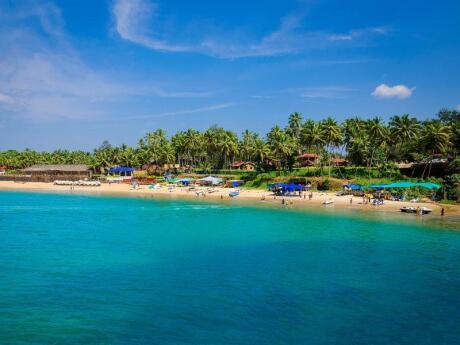
If there was ever a place to go and recharge, it was Goa. Goa's coast is, of course, the most popular area for tourists, with so many stunning beaches as well as bars and nightclubs for partying. While it's great for a lazy day on the beach, we loved Goa for the many wonderful watersports on offer, from jet-skiing to parasailing and even banana boat rides! If crowds and parties are not your thing, CNN-Travel rates Goa's Patnem Beach as one of the top 20 beaches in Asia. It's much less crowded (and less expensive) than the famous Palolem Beach, so you can enjoy a spot of sunrise yoga on the sand in solitude.
Explore the mountainous region of Ladakh
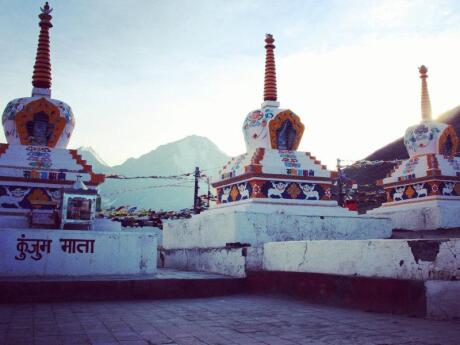
Generally, when one thinks of India they think of heat and noise, but in the north of India are some of the most stunning, peaceful landscapes in the country. The Ladakh region is sparse, beautiful, and one of our favorite places to visit in the whole country. Ladakh culture is very similar to Tibetan culture (the two share a border), so it's perfect if you want to explore Buddhist monasteries or go hiking in the mountains. The city of Leh is a must-visit if only so you can use it as a trekking base to acclimatize before going to higher altitudes. There are also charming old streets to wander in, bustling markets, and Leh Palace – an interesting example of medieval Tibetan architecture.
Wander among the monuments of Hampi
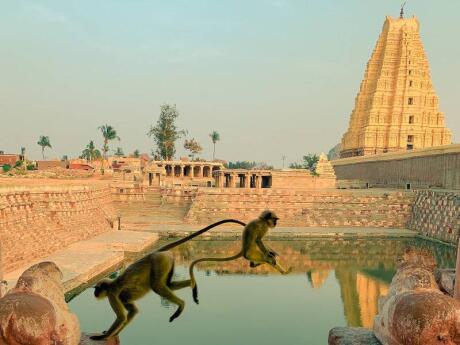
Hampi is an alluring landscape, filled with temples and ancient buildings, boulders, and mountainous terrain. A group of 500 monuments makes up the UNESCO World Heritage Site, as they are all that is left of the last capital of the last great Hindu Kingdom of Vijayanagar. Hampi was the main pilgrimage center for the Hindu religion, so nowadays you can visit to explore the remnants of incredible temples, shrines, halls, forts, water structures, royal elephant stables, and more. The whole place is a massive open-air museum! To really experience the magic, you can join this two-day tour to Hampi from nearby Goa.
Visit the Caves of Ajanta
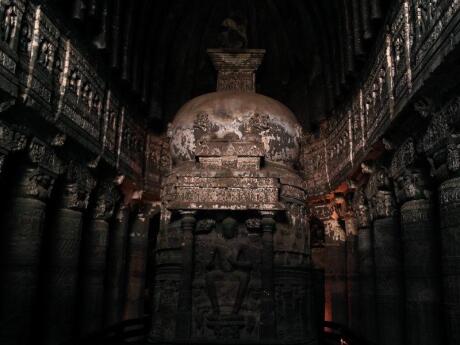
The Ajanta caves date back to the 2nd century and consist of around 30 rock-cut cave monuments. Described as some of the finest examples of Indian art, visitors will find wall paintings and sculptures. There are also some fascinating examples of storytelling through the paintings. From the births and reincarnations of Buddha to the various other Gods and deities who embody Hinduism. It is no wonder monks have used the caves as a place of refuge and solace. We recommend joining a tour to the Ajanta Caves from nearby Aurangabad as the roads to get there are pretty rough – let someone else do the driving!
Try not to get lost in Chennai
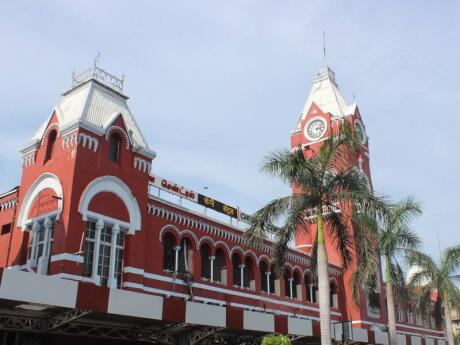
Chennai is a sweltering, bustling, urban city that might not be high on your list of places to visit in India. But we think you'll be missing out if you don't go! We've already mentioned Chennai's fabulous Pride festival and gay scene, but there's plenty more to explore if you're not visiting during Pride season. Chennai is home to the world's second-longest urban beach in the world, so you can spend some time enjoying the sun and sand when you need a break from the city. You can join a tour of Chennai to visit the beach as well as the famous St. George Fort and the amazing architectural style of the Kapaleeshwarar Temple.
Sail down Kerala's Backwaters
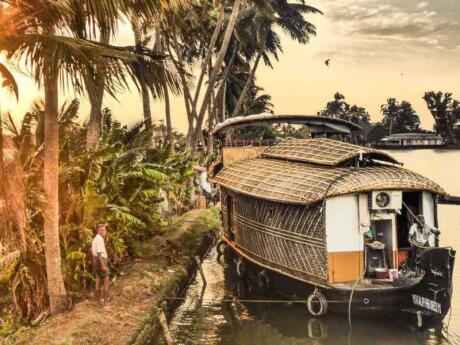
For us, the highlight of the region.
We rented a houseboat for a few days and sailed along the backwaters of the network of connected rivers, lakes, and canals that make up the backwaters of Kerala.
It was super romantic. We passed local villages along the Kerala coast and had one of the best meals from our onboard chef, who cooked everything from scratch.
Learn to dance Bhangra in Delhi
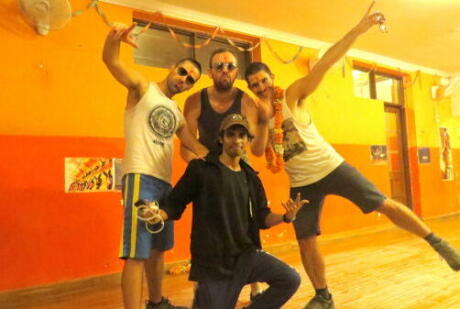
If you've not seen a Bollywood movie, then you need to! We guarantee you'll quickly fall in love with India – full of color, drama, super camp music, and the highlight, the dancing! All those high-energy “I'm changing a lightbulb!” moves – we LOVE it! So, as soon as we hit the ground in Delhi, we found an ace dance studio that specializes in teaching Bangra and other Indian dances. The Delhi Dance Academy is the place to go. Trust us – you'll LOVE it! Plus – you get an awesome takeaway video of your day to share with your friends and family.
Gay tours in India
If you'd like to join a gay tour group to explore India with other travelers, then you have a variety of excellent choices available for you. Group tours are an excellent way to make friends if you're traveling by yourself, or if you simply want someone else to organize all the logistics of transport and accommodations.
1. India: Holi Festival Foray with Out Adventures
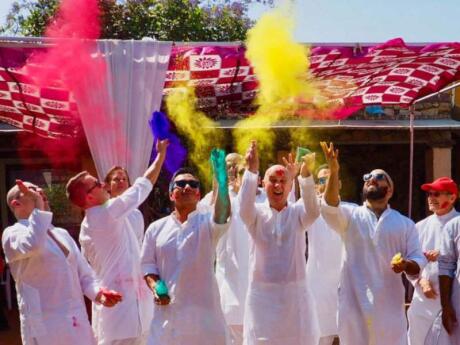
Lovers of all things colorful will probably be dying to visit India during the riot of color that is Holi. With Out Adventures you can join a tour that takes place in the middle of the Holi Festival so that you can experience all the wonderful madness of the Hindu festival of colors with other gay travelers. Holi is a celebration of spring, so this tour takes place every year in February/March. You'll be traveling with other gay men through the cities of Delhi, Agra, Jaipur, and more, with plenty of time to sightsee famous spots like the Taj Mahal.
2. India Holi Festival with Zoom Vacations
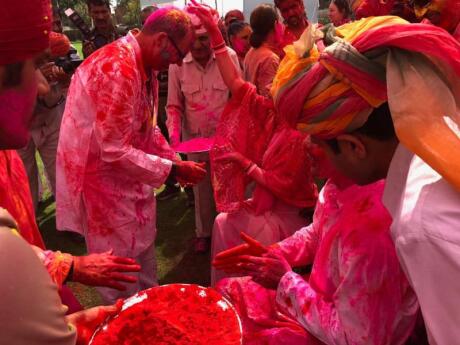
Can't get enough of the idea of Holi? Well, Zoom Vacations are also offering an India Holi Highlights tour every February and March. One major difference with this group tour is that you'll actually get to celebrate the festival of Holi at the grand Umaid Bhawan Palace with His Highness and other members of the Royal family of Jodhpur. While technically Gaj Singh II was stripped of his royal title when he was 23, he has gone on to shape Rajasthan as a major tourist destination. As well as exploring this majestic region on your tour, you'll also have the opportunity to visit the Taj Mahal and lots of other incredible sights.
Pride and other gay friendly events in India
There is no event quite like a gay event. With cities donning our community's signature rainbow colors for Pride, films representing LGBTQ people of all shapes and sizes, and a pageant that puts Ms. Universe to shame, here are some of the best gay-friendly events to see in India.
Mr. Gay World India Pageant – January
January doesn’t just mean ringing in the New Year for the LGBTQ community in India. It means waiting for the Mr. Gay World India pageant to begin. Every year in Mumbai, a team of experts works towards finding out who will represent India at the international event later in the year. Some of the criteria to be crowned the winner include a unique combination of looks, charm, intellect, confidence, awareness, and self-esteem. Easy right? Judges receive thousands of applications every year. It must be such a tough job to have to sift through so many videos and pictures of stunning men! The contestants must compete in different categories. They are then assessed on their writing skills and social media presence. Sounds like Drag Race on steroids! Finally, a few are chosen, and a grand finale is screened in clubs across the country. Fans avidly root for their favorite, and the winner becomes an overnight sensation!
Mumbai Pride – Jan/Feb
Taking place in the early months of the year, Mumbai Pride washes the already colorful city with an even brighter coat of paint. With a program jam-packed with events across the city, from yoga to storytelling evenings to dance parties, there is something for everyone. One recent noteworthy event was Queer Hugs in the 2020 Pride: meeting up outside Mira Road station, queer activists gave out free hugs to those passing by. Anything that spreads love is a win in our eyes. And as one of the more progressive cities in India, we find that Mumbai is a truly fabulous location to go to and celebrate Pride. The program also lists a night of Queer Heroes that celebrates the pioneers of the LGBTQ movement. A spectacular show of music, art, and performance, Pride activists work hard to make the show as accessible as possible.
Kashish Mumbai International Queer Film Festival – June
Each May, Mumbai hosts an International Queer Film Festival. Showcasing the best examples of queer artistry; the festival is essentially a love letter to LGBTQ people everywhere. With films and documentaries that highlight gay love, the work for equal rights, or drag, the festival offers a safe space for those who may otherwise struggle to find themselves represented in entertainment. It attracts people from all over the world – even Sir Ian McKellen flew over to inaugurate the festival in 2016! With panel discussions, workshops, and opportunities for anyone to participate in volunteering programs, the festival is a joyous, jam-packed event.
Chennai Rainbow Pride – June
Chennai Rainbow Pride takes place during Pride month which makes it feel a little special. Also, like other Pride events, it lasts for a whole month – with marches, film screenings, and performance art pieces that honor Indian and queer culture. Throughout June, the queer community can celebrate everything that makes them unique. It is their time to be seen – via poetry readings, or watching a gay love story in the cinema, or feeling brave enough to hold their partner’s hand whilst attending the Pride parade. Chennai Pride sees people of all kinds of gender identities come out onto the streets and party their hearts out.
Namma Pride (Bangalore Pride) – Oct/Nov
Shouting at the top of their lungs, ‘we’re here, we’re queer, get used to it’, the scenes of Bangalore's Namma Pride echo those from the New York City Stonewall protests. Whilst this event is considerably more peaceful than that of 60s Manhattan, Bangalore Pride still adopts a feeling of urgency: “change must happen now…or else!” The marchers look angry. The messages on the signs are mad. The chants are loud, clear, and demanding. All in order to catch the attention of Indian lawmakers and encourage them to advance the LGBTQ rights movement. It proves that the community in Bangalore is not only passionate about gay rights but women’s rights as well. The festival as a whole is used as a movement that benefits all.
Delhi Queer Pride – November
Since 2008, Delhi Pride has transformed the usual chaos of Delhi into a campy chaos. The best kind of chaos. It generally takes place in the form of a parade on the last Sunday of November. People come by in droves, decked out in full rainbow extravaganza, marching down Barakhamba Road to Tolstoy Marg to Jantar Mantar. Though it never fails to put smiles on the faces of all those who participate (and watch), it has felt even more significant over the last few years, since India’s monumental decision to legalize gayness.
Kolkata Rainbow Pride Walk – December
In what is the oldest Pride march in India, Kolkata’s Rainbow Walk was originally called… “the Friendship Walk”. As after all, gay couples are just really close friends, right? i.e. Bert and Ernie… For over 20 years, the march has brought together LGBTQ rights groups from around the country to spread the message of love, equality, and tolerance for all. It generally starts in Jatin Das Park and finishes at Vivekananda Park. Thousands of people attend each year to either participate or watch the proceedings. For those short hours, the city is awash with campy couture, color, and sparkles.
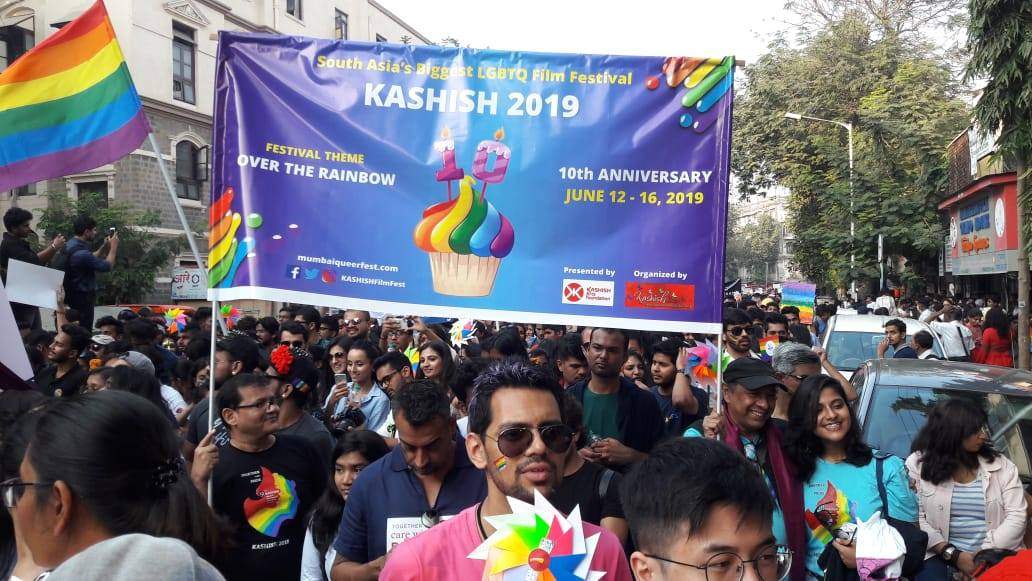
Food and drinks in India
There are so many different types of delicious dishes to try in India. Eating in India is truly going to be one of the highlights of your trip. We’ve only included a fraction of the best foods and drinks that we loved the most. Though be warned, some of these dishes are hot hot hot!!!
Curries and Indian Thalis
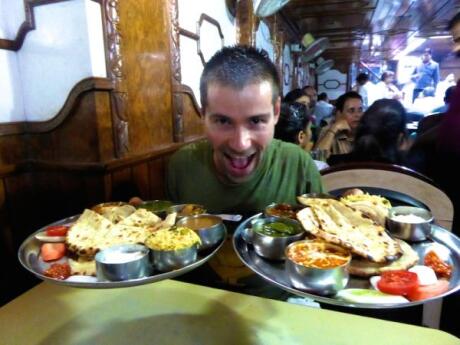
Do you think you know what an Indian curry tastes like because of your Friday night takeaway? Oh, honey, jog on…! Authentic curries are creamier, hotter, and tastier than you could ever have dreamed. Depending on whatever region you're traveling through, you’ll find many different kinds of curries. Those in the north take a page from the book of the Persians, filling their curry dishes with tandoori and parathas. This helps give it a sweet taste. Whereas in the south, curries are very hot and can feature seafood. There are so many variations, including meats, lentils, and other veggie-based dishes.
Tandoori Chicken
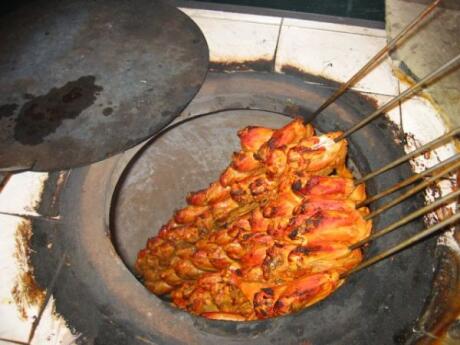
Tandoori Chicken gets its name from where it's cooked. The chicken is roasted inside a special cylinder clay oven known as a tandoor and is marinated in yogurt and mixed spices (usually garam masala, garlic, ginger, and cayenne pepper). It's this oven that helps create the signature smoky flavor of Tandoori. It is fabulous with curries or other sauce-based dishes and is made even better with the addition of some freshly baked naan bread on the side. We found tandoori chicken very easy to come by in any place we went to but also noticed just how different each region makes its own tandoori spice mix.
Matar Paneer
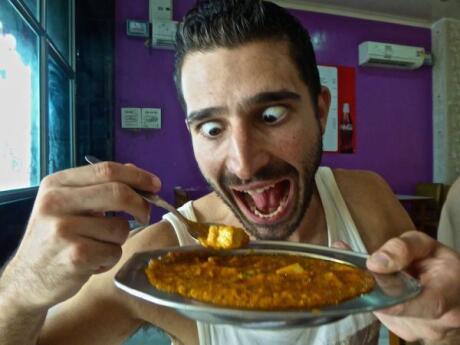
One of our personal favorite Indian dishes is Matar Paneer. I mean, can you blame us? It combines cheese with curry! We’re obsessed! It is made using the Indian cheese of Paneer. The paneer is mixed with peas, garam masala, and a tomato-based sauce to create this delicious vegetarian meal. Sometimes it's also made with potato, corn, yogurt, or cream, and served with naan bread, roti, or rice. Matar Paneer is a wonderfully comforting home-style meal since it uses such simple ingredients but is still so warming and yummy!
Sambar with Dosas and Idlis
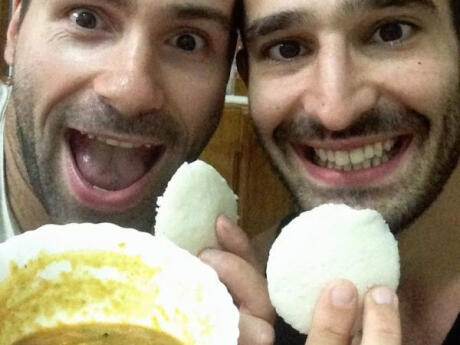
Sambar is usually served as a main course in southern India. A type of chowder, it is typically made from lentils and cooked using a broth. On the side, you'll usually get some Dosas, which are made from a kind of rice batter. These feel so smooth and light! You eat them by wrapping them around meats or any other desired filling. To top this off is the Idlis. These are steamed savory cakes made from steamed lentils and rice. They're perfect for dipping into those spicy sambal sauces. Most people in south India will commonly eat Idlis for breakfast.
Puttu
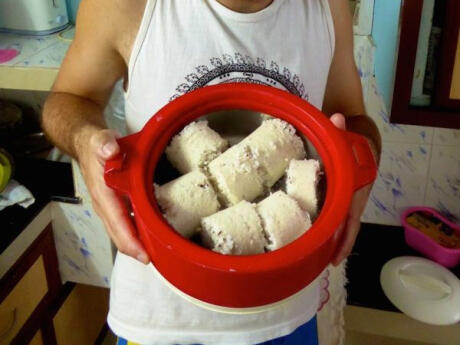
Wake up to some Puttu! One of the most popular breakfast dishes in Kerala (and also in Sri Lanka), Puttu is made from steamed cylinders of ground rice, which are then layered with coconut shavings. We also like it with sweet or savory fillings on the inside, especially some banana at breakfast time along with our coffee. It can be enjoyed hot or cold, depending on the time of day you are having it. Puttu is interesting to make as well since you generally need to use a special metal puttu kutti vessel with two sections. In the alternative, you can also use a pressure cooker in a pinch.
Barfi
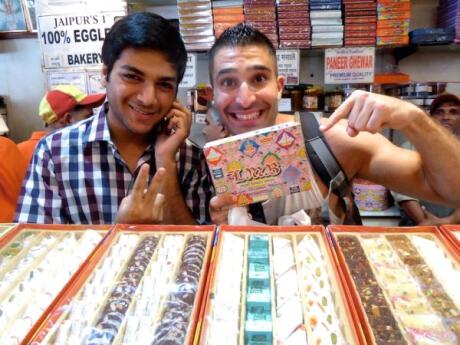
We know what you're thinking, why would anyone want to eat something that sounds like barf?! But Barfi is an Indian sweet that is made from condensed milk. The name actually comes from the Persian word barf, which means “snow”. There are different types of barfi including badam, which is made from almonds, pista (pistachios), and kaaju (cashew nuts), so definitely a good source of protein for any gym bunnies who are bulking. Fruits are also used to enhance the flavor, particularly mango and coconut, as well as spices like cardamom.
Lassi
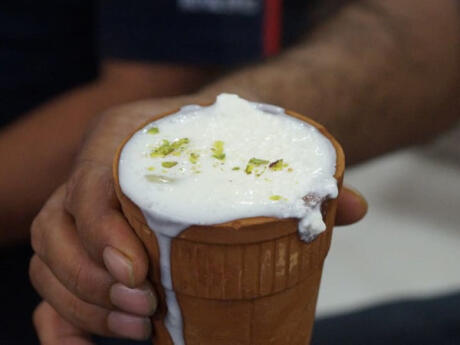
No, not the dog! Lassi (without the e) is the ultimate Indian thirst-quencher. It's a yogurt-based drink that can be enjoyed either salted or sweet. We liked having it alongside our breakfast or as an accompaniment to a spicy Vindaloo curry. Its creamy and cool texture really hit the spot when we were craving something sugary but didn’t want to gorge on anything too unhealthy. There are many different varieties of Lassi such as mango, coconut, and rosewater. One of the most unique to look out for is the rich saffron-flavored lassis of Rajasthan.
Masala Chai
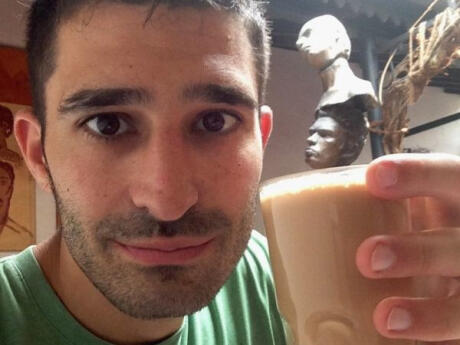
It wouldn’t be a true trip to India unless we indulged in one of India’s most beloved exports – tea. Plus, as gay men we are automatically wired to seek out the hottest tea there is – though that is technically a different kind of tea! Masala Chai is an Indian milk tea that is made by brewing black tea and then flavoring it with a mixture of aromatic spices. Chai was originally made using green cardamom pods, cinnamon sticks, ground cloves, ground ginger, and black peppercorns. Nowadays a ‘chai latte' is a popular drink around the world, although the original is definitely the best!
Samosas
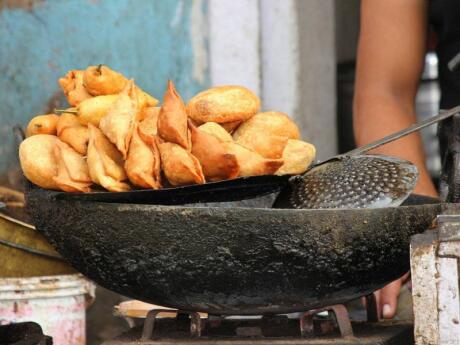
Samosas are a delicious Indian appetizer or snack that comes in the form of a deep-fried pastry. They're usually filled with a savory filling, like potatoes, onions, meat, lentils, or peas. Every region in India has its own special way of making it, with some places even opting to make it super spicy for added fun. One of the tastiest we tried was in Hyderabad, which has mincemeat filling with a subtle sweet taste. Depending on the region where they're made, samosas can also come in a variety of shapes, usually triangles, cones, or half-moons. They're often served with chutney, another yummy Indian staple.
Biryani
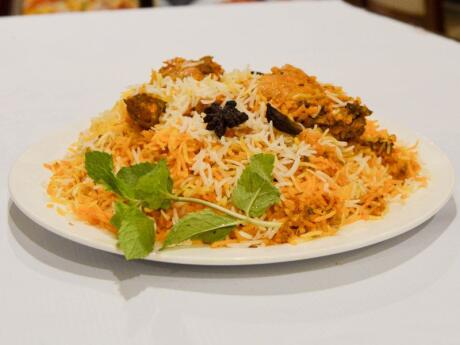
Biryani is another curry-based dish. The word “biryani” comes from the Persian word “Birian”, which means ‘fried before cooking', and Birinj, which is the Persian word for ‘rice'. Biryani differs from just ‘curry with rice' in that the curry and rice are cooked separately, then layered together before being cooked again. Usually made with the addition of chicken, beef, or pork, it's sometimes made with goat, prawns, or fish as well. Biryani can also fall anywhere on the scale in terms of hotness, with spices like nutmeg, pepper, cloves, cardamom, and chilies to spice it. We personally like ours on the hotter side – if we wanted mild, we’d have stayed in London (sorry, not sorry)!
Naan Bread
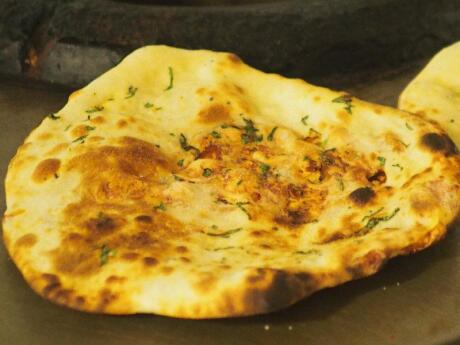
If we could only live off one food group for the rest of our lives, it would be garlic naan bread. It's super filling, very tasty, and oh so very unhealthy! Naan bread from India is definitely one of our favorite kinds, a type of leavened bread that is baked flat and goes alongside many Indian dishes, especially curries. We love scooping up some of the food into the bread, allowing us to bite into a cacophony of texture and taste. In India, you may often find Naan stuffed with different fillings, used like a wrap or even with toppings. It's just so versatile but always delicious!
Vindaloo
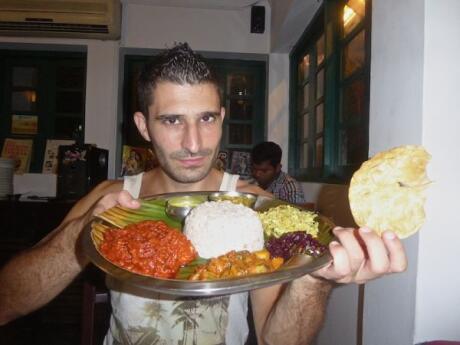
Goa called and they wanted to let us know that Vindaloo is their favorite curry! It's also probably the closest to what British people would determine as “a curry”. It's traditionally made with pork, which is then marinated in palm vinegar and garlic, with dried red chili peppers added later. A Vindaloo curry is something you can almost always find on the menu at an Indian restaurant in London since it was brought back by the British when they occupied India. It's a spicy, fiery dish – perfect for when you feel like you're getting a cold and need a hot curry to clear those sinuses out!
Chicken Tikka
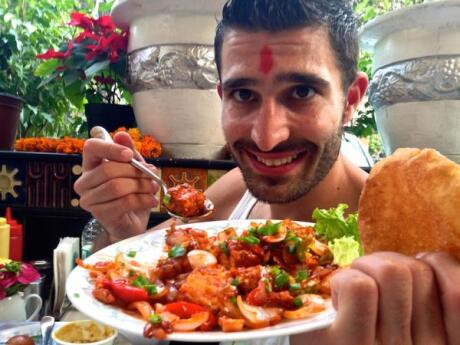
Ok, if you're from the UK then you might think ‘chicken tikka masala' when you hear Chicken Tikka but don't get them confused! Chicken Tikka Masala is a type of chicken curry with an orange sauce, but Chicken Tikka is a dish where chicken is cooked on skewers over a special kind of brazier called an angeethi. So it's essentially like an Indian chicken kebab! I mean, if you're making Chicken Tikka Masala, then making the Chicken Tikka is the first step, but we loved eating these mouthwatering sticks of chicken as they are, usually served as an appetizer.
Plan your trip to India
We've put together some handy hints and tips to help you plan your own trip to India. Read on to find out everything the gay traveler should know before they go.
Travel insurance: Sometimes when you're traveling, things just don't go as you want them to. Whether that's an injury or illness, or just a canceled flight leaving you stranded, we recommend all travelers to India make sure they're protected with adequate travel insurance. We love using Heymondo Travel Insurance because their coverage is so comprehensive and affordable, plus it's easy to make a claim online when you need to.
How to get there: Most travelers will arrive in India by flying into one of the International Airports of Delhi or Mumbai. You can also travel into the country overland from Nepal, Pakistan, Bangladesh, or Bhutan, but flying is definitely the easiest and safest option with the border disputes, etc. We flew into the Chhatrapati Shivaji International Airport which is close to Mumbai, then organized a private transfer from the airport to our hotel. We always find this to be the easiest thing to do when first arriving in a new destination, so we can relax and not have to juggle luggage on unfamiliar public transport, especially if we're jetlagged!
Visa requirements: Travellers from all countries outside of India do need a valid tourist visa in order to enter the country. US citizens can get 6-month, 5-year, or 10-year tourist visas, but travelers from most other countries can only stay for up to six months on the tourist visa. Check your visa requirements and apply for your India tourist visa here.
Getting around: India is big (duh) so there are lots of different ways to travel within the country. The train network, in particular, is almost a classic experience you need to have in India and works much better than you might think. You can also fly between regional cities, catch buses or even travel by boat. Here's a more detailed guide on getting around within India.
Vaccinations: All travelers to India should make sure they're up to date with routine vaccinations along with getting ones for Hepatitis A and Typhoid. Depending on which part of the country you're planning to visit, what you will be doing and where you are traveling from, you may also need further vaccinations for things like Cholera, Malaria, Rabies, Hepatitis B or Yellow Fever. Here is the latest vaccination advice from the CDC but make sure you also check with your doctor before you travel.
Currency: The currency used in India is the Indian rupee which uses the code INR and the symbol ₹. $1 US converts to around ₹71.23, £1 will give you about ₹92.66 and €1 converts to roughly ₹78.66.
Tipping culture: Tips in India are called baksheesh, but the rules for tipping are somewhat murky. Generally, you would only tip for extra good service, but in places like hotels, it's expected that you would tip someone for carrying your bags or valeting your car. Some restaurants might include a service charge, some might not. In general, the more touristy a destination the more tipping is expected, but you can read this guide to tipping in India for more nuanced information.
Internet access: Most hotels, restaurants, cafes and hostels in India will offer free WiFi or you can always head to an internet cafe to get online. Do be aware that the free WiFi might not always be terribly fast, so if you want reliable access or have a lot of work to do, you might want to bring a portable WiFi device with you.
Online privacy: Gay dating apps like Grindr or Scruff aren't blocked in India, but do be aware of instances of catfishing if you're planning to use them. If you want to use the internet securely we recommend using a VPN like those provided by ExpressVPN. They give you security at an affordable price and are very reliable as well.
Accommodation: We definitely recommend using Booking.com when searching for the best accommodation in India. They have all the best choices and many listings offer free cancellation if needed. Their online customer service is excellent and available 24/7, plus it's easy to make all your bookings online.
Sightseeing and adventure: We also use, love and recommend GetYourGuide when looking for fun things to do in India! They have so many exciting tours, activities and classes available for all the best prices. The online booking system is also easy to use and their excellent customer support is available 24/7.
When to visit: India is such a big country that the weather can be varied no matter what time of year you visit. However, the cool, dry season between November and March is generally the best time for most parts of the country. If you're not used to humidity and heat, then the monsoon season between June – September is not going to be fun, apart from in the mountainous northern regions.
Safety tips for gay India
Is India safe for gay travelers? The short answer is pretty much, YES! But do be cautious about engaging in PDAs unless you're in a safe space. Indians are generally polite and friendly people but remember that poverty is a huge issue in this country, so pickpocketing and other petty crimes are also common. But with a bit of common sense and our handy tips, you can absolutely visit India safely.
- Check official government advice before you go. You should always do this before you travel anywhere really, but definitely make sure that you're up-to-date with recent events in India that may cause travel difficulties. Here are the most recent updates on India for travelers from the UK, but check your own country's official advice if you're traveling from elsewhere.
- Although being gay is legal in India, avoid public displays of affection. Indian society can be socially conservative and older Indians still frown on LGBTQ lifestyles. Especially in more rural areas, we recommend toning it down a notch. We didn't encounter any problems during our time in India, but we also didn't flaunt our relationship in public either, unless we were in an actual gay bar, club, or at a Pride event.
- Just like anywhere in the world, be aware of your surroundings, especially in big cities. Indian cities can be chaotic and crazy, so be extra vigilant about your belongings. Petty theft is the most common crime in India, and tourists are often seen as being well-off and therefore excellent targets.
- Avoid excess alcohol and drug use. Again, this is something we would recommend no matter where you're traveling, as the last thing you want is to get wasted and lost or taken advantage of in a completely unfamiliar place. You can still enjoy yourself of course (we're not total squares!), but be aware that obviously intoxicated people are much easier targets for theft or other crime.
- Don't wear valuables in public. As we've mentioned, if you flaunt expensive items or stacks of cash, you'll be seen as a prime target for pickpockets pretty much anywhere you travel, including India. We recommend leaving valuables in your hotel safe and only carrying around what you will need for the day in terms of cash.
- Invest in a good money belt. A great way to keep your cash, cards, or other valuables like your passport safe when traveling is by using a good money belt. Ones that can be worn under your clothing are excellent as it's much more difficult for people to steal from you if they can't even figure out where your stuff is!
Read more travel adventures like this in our book!
We've published our very own gay travel book called, ‘Out in the World'. It has all our practical safety tips, first-hand advice, and travel stories from some of our favorite destinations.
We hope it inspires you to have a fun and safe trip!
Click on the book to order:

For more inspiration:
- If you're heading to India from Nepal, check out how to get your India visa from Kathmandu
- Then make sure you read our gay Sri Lanka guide and head there as well
- If you need convincing, this Sri Lankan food and drinks guide will make you drool…
- Animal lovers will want to see the elephants at Udawalawe in Sri Lanka
- And you can even go blue whale-spotting in Sri Lanka as well!
- Find out what it's like to travel through Asia as a gay couple
- While these are the most gay friendly countries in Asia
- If you like to sail the seas, check out these wonderful gay cruises heading to Asia
- And if you prefer to get under the waves, these are our favorite scuba diving sites in Asia
Like this post? Pin it
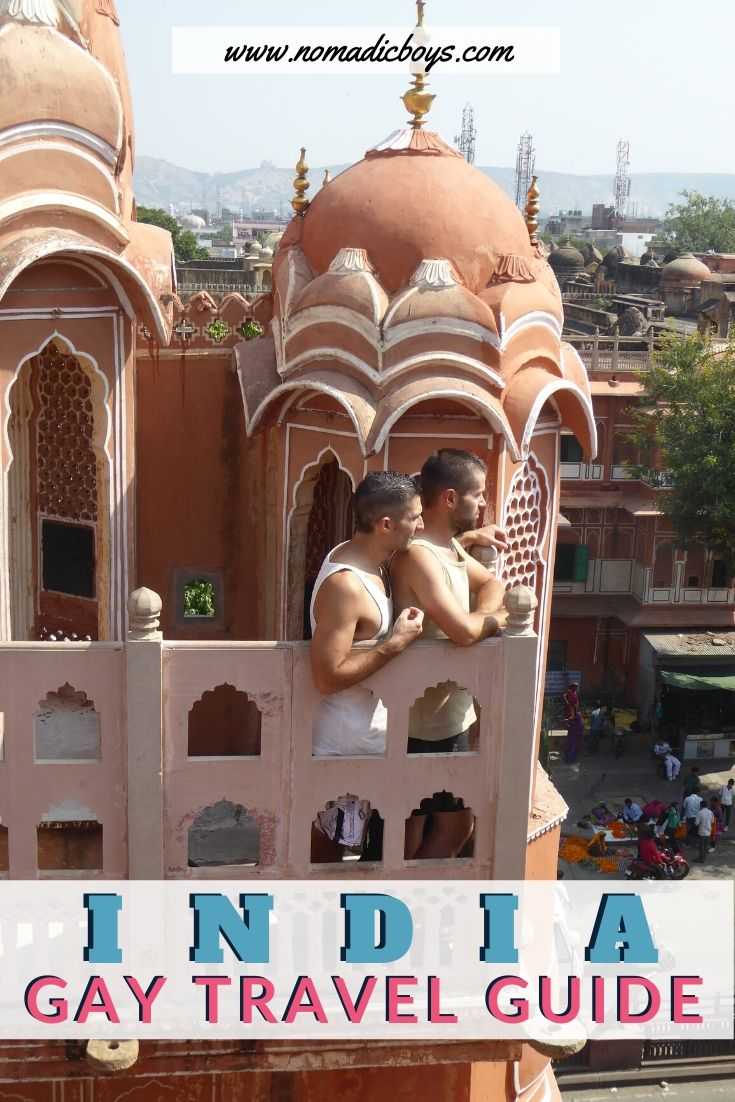

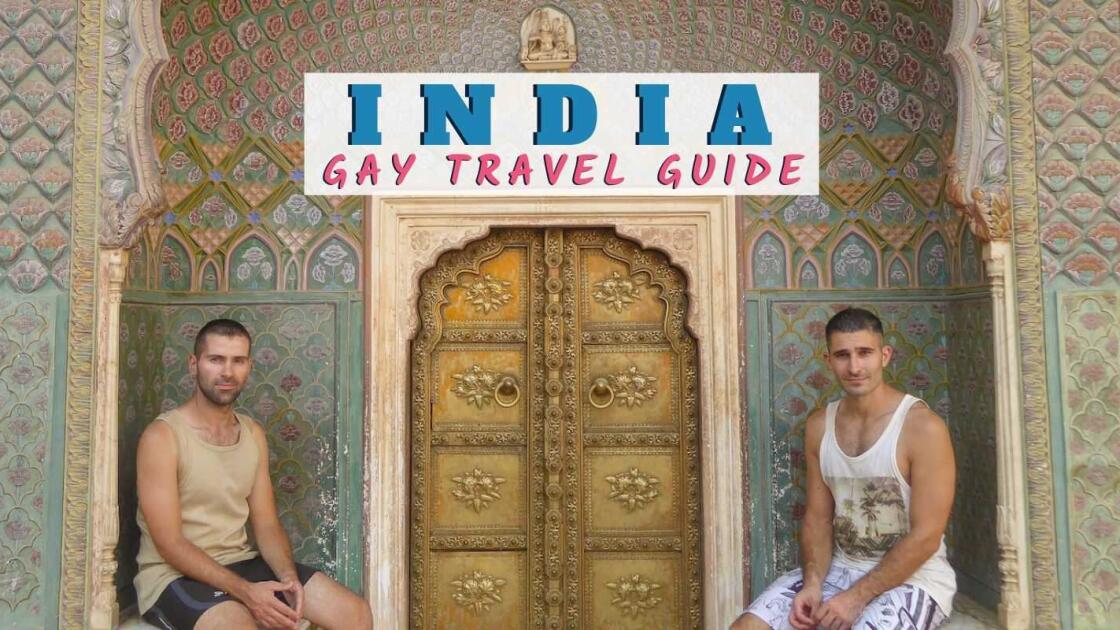
John
Monday 15th of December 2025
This is great information, many Indian gays are doing as guide for western gay tourists. That is very comfortable for both parties. Some gays in India try to cheat for money western traveler sometimes, but generally very God combination.
Stefan Arestis
Wednesday 17th of December 2025
We had a very positive experience with the LGBTQ+ community of India.
Kandarp Jain
Sunday 3rd of May 2020
Nice and well articulated and informative blog. Surprised and curious to know how much time did you spend here to get such a lot of information and so accurately about this Vast Country.
I am a globe trotter based out of India and run a Airbnb in Delhi ( The Van Gogh House in Delhi ) and happy to partner and assist. Let me know your thoughts.
Love U2 - KJ-
Stefan Arestis
Monday 4th of May 2020
Thanks Kandarp. We spent a long time travelling across India during our big trip in Asia a few years ago.
Saturday 9th of July 2016
0
Nikita
Saturday 4th of July 2015
These guys sound like so much fun! I didn't realize the laws in India were moving backwards in India in such a horrible way... It's quite heartbreaking, really. It's so sad that people can't even come out to their own families! Thanks for sharing this.
Nomadic boys
Saturday 4th of July 2015
Thanks Nikita xxx
Ankita
Monday 11th of May 2015
First of all -- those ain't even the best of our puppies. We got much better ones. Also, the current government is banning EVERYTHING. Right now they're trying to ban beef consumption. Unfortunately, I don't think the law is going to go very far with regard to liberalism. However, people of my generation, at least those formally educated, have a relatively liberal approach. I haven't met too many marriage equality supporters, but a great many agree with decriminalization, even if only for the fact that they believe personal lives are not the law's business. So there's still hope, even if it is the form of a rather Don't Ask Don't Tell-style approach -- which doesn't sound very nice, but would be a big improvement given the current conditions. P.S.: Next time you're in India's gay scene, please talk to youngsters you meet about the perils of 'counselling' and such... I've read about so many gay youth getting (and later regretting) gender reassignment surgery because 'doctors' don't know the difference between gender and orientation.
Nomadic boys
Tuesday 12th of May 2015
Hi Ankita and thanks for your comment. It's lovely to see open minded views like this. I've heard about 'counselling' and it just sounds horrific!